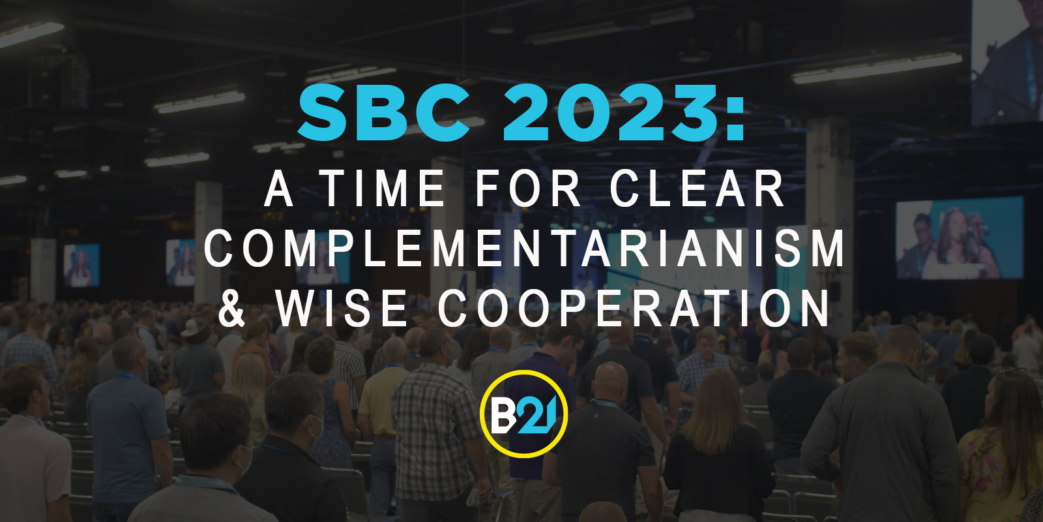Every year Southern Baptists face challenges. This year is no different. Southern Baptists are wrestling over how to address issues related to sexual abuse prevention, women pastors, and the nature of cooperation. All of these discussions are taking place at a time when trust is low and tribalism is on the rise. Nuance is difficult. Yet, that is exactly what is needed.
As Southern Baptists think about the issue of women pastors, we believe that Southern Baptists must be clear about our complementarian convictions and wise about applying our cooperative standards. In what follows, we’d like to offer a few thoughts on how we can move this discussion forward better together.
1. Southern Baptists Should Clearly Affirm Our Complementarian Convictions: Rejecting Saddleback’s Appeal
We believe the SBC messengers should uphold the removal of Saddleback because Saddleback does not have a faith and practice that “closely identifies” w/ the BF&M2000 (See article 3.1.1). Furthermore, they have doubled down in their defiance of article 6 of the BF&M2000, which states, “the office of pastor is limited to men as qualified by Scripture.” Not only did Southern Baptists reject the arguments that Rick Warren is making for women pastors, when Southern Baptists adopted the BF&M2000, most egalitarians have quit using them as well. Southern Baptists will most likely hear Warren challenge Saddleback’s removal, arguing that he is in line with Lottie Moon and Annie Armstrong. Yet, neither Lottie Moon, nor Annie Armstrong, thought women should hold the office of pastor. Southern Baptists should continue to hold clear complementarian convictions this year at the SBC.
(This past November, Baptist21 addressed more fully why Saddleback’s recent egalitarian changes were out of step with the BFM2000. You can read that article here along with an earlier discussion about the way forward.)
2. Southern Baptists Should Wisely Apply Our Cooperative Standards: Revisiting Article 3.1
Until 2015, the BF&M2000 wasn’t used as an enforcement document. That year Article 3.1 was added. It states, “The Convention will only deem a church to be in friendly cooperation with the Convention, and sympathetic with its purposes and work (i.e., a “cooperating” church as that term is used in the Convention’s governing documents) which: Has a faith and practice which closely identifies with the Convention’s adopted statement of faith.”
The presence of Article 3.1 brought with it the need for clarity concerning how much of the BF&M2000 needs to be affirmed to be in “friendly cooperation.” Because of this, we believe there are 3 options before us:
- We can bring clarity to what line 3.1 means so as to provide clarity to how the BF&M2000 will govern our cooperation.
- We can leave it as it is, with the ambiguity, and let the credentials committee (and then potentially the messengers) be the enforcer year after year.
- We can remove line 3.1 and go back to how things were.
We believe option 1 is the best path forward because a lack of clarity in times of distrust will not serve anyone. We know there are proposed amendments, like Mike Law’s amendment. Amendments like Law’s, while clear about our complementarian convictions, still fail to address what “closely identifies” w/ the BF&M2000 actually means. Instead of relieving our problems, we think they’ll lead to more, all of which stem from a lack of clarity about our standards for cooperation. Here are at least two of the problems:
- It would still leave a lack of clarity on what other parts of the BF&M2000 must be “closely identified” with in order to be in friendly cooperation. We do not want to get in the habit of saddling the Credentials Committee with loads of work and putting them in a place to bring Saddleback type votes to the convention floor year after year. For instance, churches who practice open communion could be brought before the Credentials Committee. The same logic that applies to Saddleback could apply to them. Yes, those two issues are not equal, but a lack of clarity here in low-trust times, leaves us open to being portrayed as more political than convictional on these issues, more anti-woman than pro-Bible.
- While we want a clear complementarian convention, we do not think it best to put a prohibition for female pastors in the same section as prohibitions against homosexuality, racial discrimination, and sexual abuse for “friendly cooperation.” Yes, all error is error, but not all errors are the same in every way. We can triage these concerns in a way that is more in line with what most Southern Baptists actually believe.
We believe there are better ways to address the error of egalitarianism, while still bringing clarity to a part of our constitution that seems unclear. We’d be in favor of another type of amendment being proposed, one that would define article 3.1 with positive statements about what “closely identifies” means such as: inerrancy, justification by faith, believers baptism by immersion, regenerate church, and qualified male only pastors/elders/overseers would be, in our opinion, a more comprehensive way forward.
By offering an amendment like this, or putting together a task force to work on an amendment like this, it would enable us to come out of this year’s SBC both clearly affirming our complementarian convictions and wisely working on our cooperative standards.
Southern Baptists are in the midst of challenging times. We must hold fast to our convictions. With around 47,000 churches in the SBC family, we must think wisely about how our cooperative standards. We hope these suggestions help us accomplish both.

